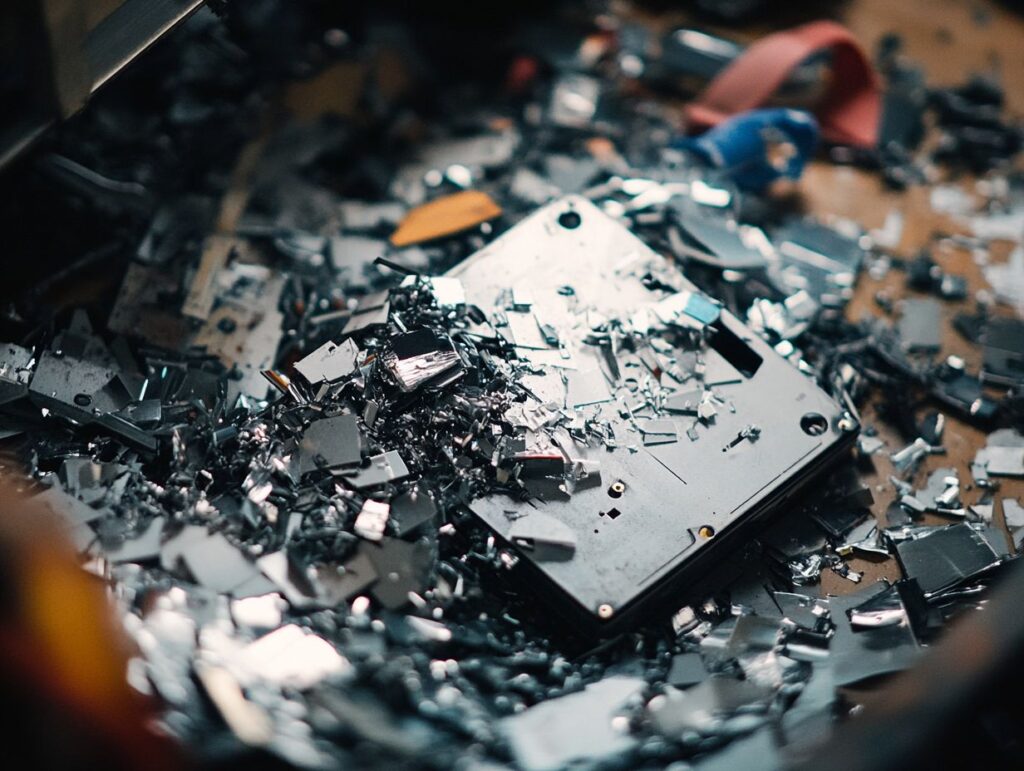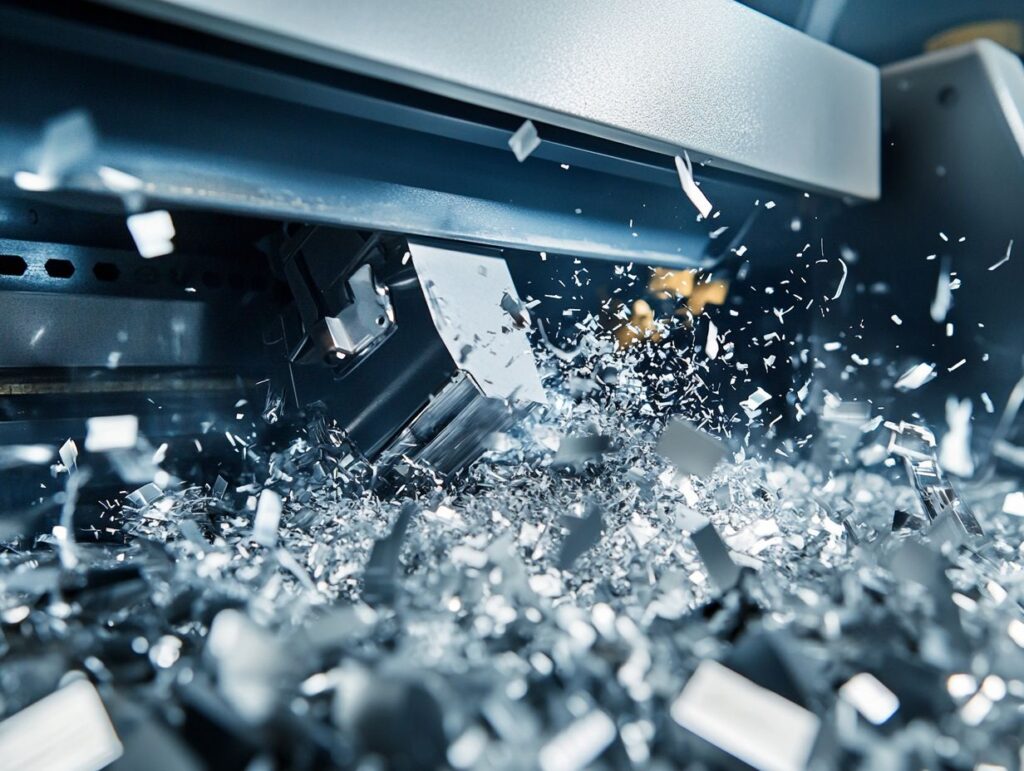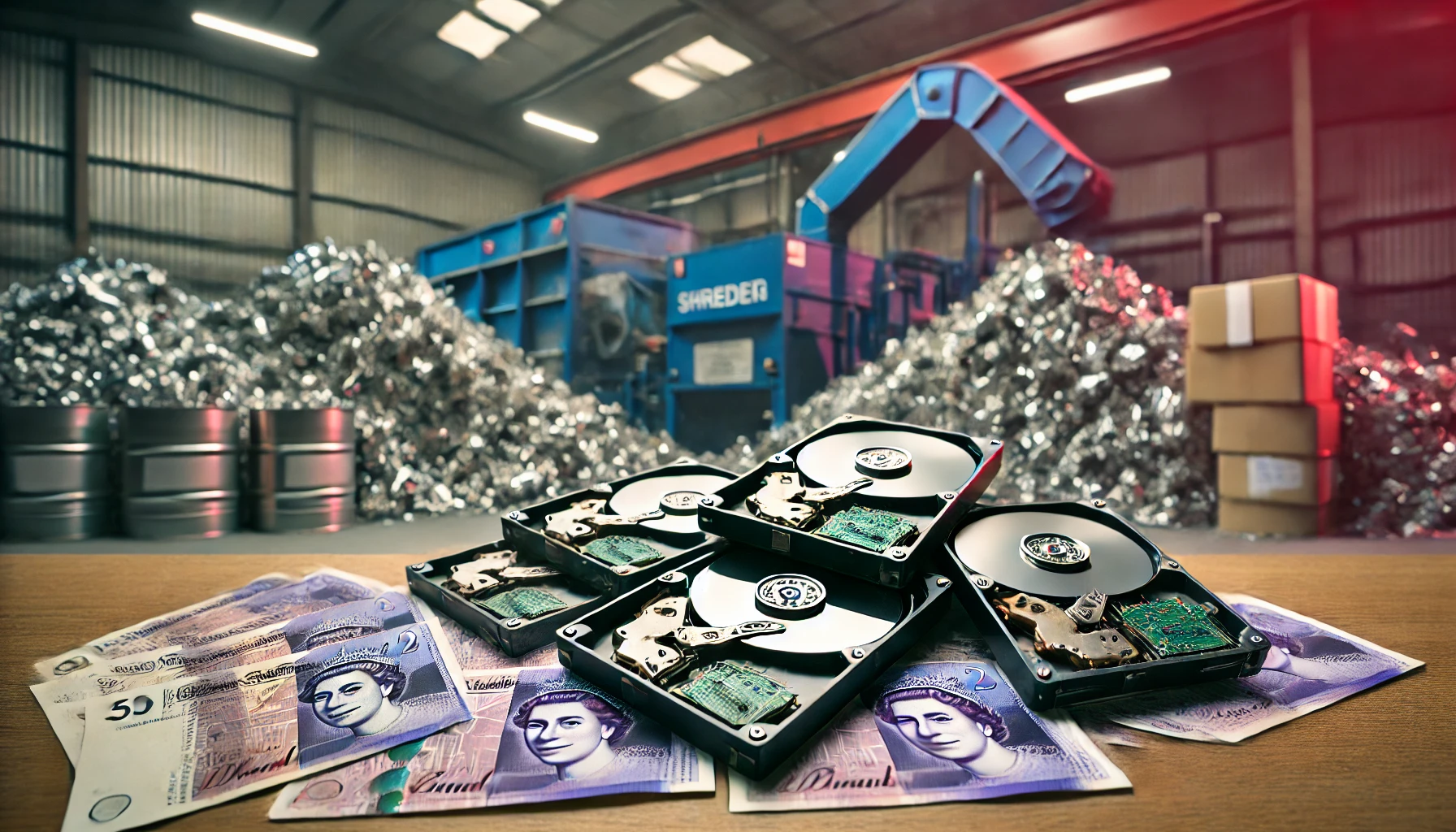Regarding protecting sensitive data, hard drive shredding stands out as one of the most secure methods. To determine the costs associated with this service, various factors come into play, such as the type and quantity of hard drives, your location, and any necessary certifications.
This article breaks down these elements and helps you understand how hard drive shredding pricing works. Additionally, alternatives to shredding will be explored, allowing you to choose the best solution for your data security needs.
Understanding Hard Drive Shredding

Understanding hard drive shredding is essential for individuals and businesses aiming to ensure the secure destruction of sensitive data. This process entails the physical destruction of hard drives, thereby preventing unauthorized access to confidential information and ensuring compliance with various security regulations.
Given the rising risks of data breaches and stringent industry standards, hard drive shredding has become a critical component of data management, especially in an era where data sensitivity is of utmost importance.
Collaborating with a reputable shredding service provider not only enhances security but also takes into account considerations such as environmental impact and recycling practices.
What is Hard Drive Shredding?
Hard drive shredding is the process of physically destroying hard drives to prevent any potential data recovery, thus ensuring that sensitive information remains confidential and secure.
This method serves as an effective solution for organisations aiming to protect proprietary data and personal information from unauthorised access. In practice, hard drive shredding may employ various techniques, including mechanical shredding, which reduces the drive to minute particles, and degaussing, which disrupts the magnetic field to effectively erase data.
It is imperative for companies to utilise certified shredding services that comply with industry standards, as this ensures that data destruction is conducted thoroughly and legally. By investing in these certified services, organisations not only protect their sensitive data but also adhere to regulations that mandate responsible data disposal.
Factors that Affect Hard Drive Shredding Costs

In the realm of hard drive shredding, several factors can considerably impact the overall costs associated with shredding services. It is crucial for both consumers and businesses to understand these price determinants, as they can vary significantly based on the type of hard drive, volume, and specific shredding method used.
Additional considerations such as labour costs, geographical location, and supplementary services—such as on-site shredding or post-shredding recycling—can also influence pricing. By carefully evaluating these elements, clients can make informed decisions and effectively manage their data destruction budgets.
Type of Hard Drive
The type of hard drive being shredded plays a pivotal role in determining the appropriate shredding method, which in turn influences the overall cost of the service.
Different types of hard drives, such as traditional Hard Disk Drives (HDDs) and Solid State Drives (SSDs), require distinct shredding techniques due to their differing structures. HDDs, characterised by magnetic platters and moving parts, can be effectively degaussed or physically shredded to ensure complete data destruction. Conversely, SSDs, which utilise flash memory chips for data storage, necessitate a more specialised approach, often involving secure erasure or advanced shredding machinery capable of handling their electronic components.
The selection of the shredding method becomes increasingly critical when considering the sensitivity of the data involved, as strict compliance with data protection regulations may dictate the level of destruction required. Both businesses and individuals must carefully evaluate the implications of data sensitivity to choose the most appropriate shredding technique, thereby ensuring that their confidential information remains secure.
Quantity of Hard Drives
The volume of hard drives submitted for shredding plays a critical role in determining the overall cost, with bulk pricing often being available for larger quantities.
For both residential and commercial clients, utilising bulk orders can significantly reduce per-unit costs, thereby capitalising on economies of scale. When businesses engage in high-volume shredding, they typically gain access to additional cost-saving strategies, which can be particularly beneficial for operations that routinely dispose of outdated or surplus data storage.
By negotiating contracts that align with their projected needs, companies can establish tiered pricing structures, ensuring they receive the most favourable rates for shredding services. Understanding these financial dynamics can give the power to clients to make informed decisions that optimise their budgets while maintaining compliance and ensuring data security.
Location and Accessibility
The location of hard drive shredding services significantly impacts costs, particularly in relation to transportation fees and site accessibility.
For example, a business situated at a considerable distance from the nearest shredding facility may incur higher transportation costs, which could ultimately be passed on to the customer. The decision between on-site and off-site shredding options is critical; companies located in urban areas may prefer on-site shredding for its convenience, whilst those in remote regions may be required to utilise off-site services due to limited local alternatives.
Additionally, accessibility is a key factor in decision-making, as businesses with tighter schedules often select services that can promptly accommodate their needs, thereby influencing overall pricing structures.
Certifications and Compliance
Certifications and compliance with industry regulations are essential considerations in the realm of hard drive shredding, significantly impacting both the cost and selection of service providers.
Organisations aiming to safeguard sensitive information should pay close attention to certifications such as NAID. These certifications not only indicate that a shredding service conforms to rigorous data protection standards but also demonstrate a commitment to operational excellence. When a service provider possesses such certifications, it typically signifies that they have undergone regular audits and training, ensuring that their destruction methods meet or exceed legal requirements.
Compliance with security regulations can directly influence pricing; certified providers generally face higher operational costs due to their adherence to these standards. However, investing in these services is crucial for maintaining security and fostering trust with clients, ultimately protecting against potential data breaches.
Additional Services
Numerous shredding service providers offer supplementary services that can enhance the overall value of hard drive shredding, albeit potentially at an additional cost.
For example, post-shredding recycling represents an eco-friendly option that ensures the remnants of discarded hard drives are repurposed or disposed of responsibly, in accordance with environmental regulations.
Additionally, the issuance of certificates of destruction provides clients with documented evidence that their data has been securely destroyed, which is essential for maintaining compliance with industry regulations and safeguarding sensitive information.
Furthermore, customised shredding features enable businesses to tailor services to meet their specific security requirements, thereby enhancing their overall data protection strategy and ensuring peace of mind in today’s data-driven landscape.
Comparing Hard Drive Shredding Costs

In evaluating the costs associated with hard drive shredding, it is crucial to obtain quotations from multiple service providers. This approach ensures that you receive optimal value for your data destruction requirements.
Costs of Different Providers
The costs associated with hard drive shredding can vary significantly among service providers, making it essential for consumers to understand the market landscape and competitive pricing.
Different providers often establish their pricing models based on a range of factors, including the specific service features offered, their reputation within the industry, and the guarantees provided for data security. For instance, a company recognized for exceptional customer service and advanced shredding technology may charge a premium compared to a lesser-known competitor with basic offerings.
This pricing variability underscores the importance of thorough research; understanding these differences can lead to cost savings and ensure the selection of a reliable provider that meets specific security requirements.
What to Look for in a Shredding Company
When selecting a shredding company, it is essential to evaluate the vendor’s reputation, customer reviews, and the specific features offered by their shredding services.
Additionally, one should consider critical factors such as the provider’s certifications, which reflect their adherence to industry standards and best practices. Insurance coverage is another vital aspect, as it protects businesses from potential liabilities in the event of accidents or data breaches.
Reputable shredding companies typically offer service guarantees, which ensure accountability for their processes. These elements significantly contribute to building trust and transparency, providing clients with peace of mind that their sensitive information is handled securely and responsibly throughout the shredding process.
Alternatives to Hard Drive Shredding

While hard drive shredding is regarded as the most secure method of data destruction, there are alternative techniques that can also effectively protect sensitive information. These include data wiping and degaussing.
Data Wiping and Degaussing
Data wiping and degaussing serve as effective alternatives to physical shredding, specifically designed to mitigate data recovery risks by removing or rendering hard drive data unreadable.
These methods are particularly relevant for organisations that handle sensitive information, where adherence to data protection regulations is essential. Data wiping entails overwriting existing data with random bits multiple times, thereby ensuring that the original data cannot be restored; this technique is applicable to both hard drives and solid-state drives.
Conversely, degaussing employs a powerful magnetic field to disrupt the magnetic domains responsible for storing data on magnetic media, effectively rendering recovery impossible. While physical shredding is a common approach, it may not always be feasible due to operational scale or the specific type of machinery involved.
In settings where data security takes precedence over hardware reuse, data wiping and degaussing present reliable and comprehensive solutions.
Physical Destruction by Other Methods
Physical destruction methods beyond shredding are available for secure data obliteration, achieving the primary objective of preventing information retrieval.
Techniques such as crushing and incineration offer viable alternatives, each presenting unique advantages in ensuring compliance with data protection regulations. While shredding effectively reduces documents or hard drives to small fragments, crushing can significantly diminish the physical size of data-bearing devices, rendering retrieval nearly impossible. Incineration completely destroys materials through high-temperature combustion, thereby eliminating the risk of data leakage into the environment.
When organisations assess these options, security considerations become paramount. The selected method must align with compliance requirements while providing maximum protection against unauthorised data access.
Frequently Asked Questions
What is hard drive shredding and why is it important?
Hard drive shredding is the process of completely destroying a hard drive, making all data on it irretrievable. It is important because it ensures that sensitive information cannot be accessed by unauthorized individuals.
What factors affect the cost of hard drive shredding?
The cost of hard drive shredding can vary depending on factors such as the quantity of hard drives, the location of the shredding service, and the level of security needed.
Does the quantity of hard drives affect the cost of shredding?
Yes, the quantity of hard drives to be shredded can affect the cost. Generally, the more hard drives that need to be shredded, the higher the overall cost.
What is the average cost of hard drive shredding?
The average cost of hard drive shredding can range from $10 to $20 per hard drive. However, this can differ depending on the factors mentioned previously.
Are there any additional fees that may affect the overall cost of hard drive shredding?
Yes, there may be additional fees such as transportation fees, rush processing fees, or fees for on-site shredding services. It is important to inquire about these additional fees before hiring a shredding service.
Are there any ways to reduce the cost of hard drive shredding?
Yes, some shredding services offer discounts for bulk shredding or for recurring services. It is also important to compare prices from different shredding companies to find the most cost-effective option.

